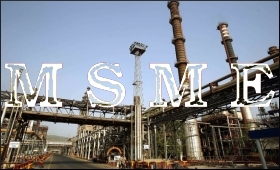|
|
|

|
Complex, high environment tax rate in Bengal hurdle to MSME growth
|
|

|
|
| Top Stories |
 |
|
|
|
IANS | 08 Jun, 2022
Chief Minister Mamata Banerjee's dreams for a strong base of the state's
small & medium enterprises (MEME) segment are faced by the hurdles
of a complicated and comparatively high rate of the environment tax
imposed by the West Bengal Pollution Control Board (WBPCB).
Recently,
a group of industry association members have highlighted this matter to
the state government and has sought its intervention to reduce the tax
rate on this count.
One such city-based industrialist, on strict
condition of anonymity, told IANS that the first tranche of tax,
christened "Consent to Establishment", is imposed at the time of the
receipt of proposal for setting up the industry.
"We have
collected comparative data on such tax imposed by the different state
pollution boards and from that data, it will be clear how high the
state's tax structure on this count is. Say for a proposed industrial
unit with investment size of Rs 150 crore, the 'Consent to
Establishment' tax imposed by the state government is Rs 17.10 lakh," he
said.
According to him, a somewhat similar tax amount in the
case of Tamil Nadu is Rs 2.80 lakh, for Bihar it is Rs 1.50 lakh, and
for Punjab it is Rs 1.05 lakh.
Then comes the second tranche of
environment tax imposed by the WBPCB which is titled as 'Concept to
Operate', which is imposed in the interim period between completion of
the setting up of the manufacturing unit and the beginning of production
process.
In this case, two rates imposed in west Bengal are
quite high at Rs 18.59 lakh for an industrial unit with investment size
of Rs 150 crore. In the case of Tamil Nadu and Punjab, the figure is Rs
2.80 lakh, for Bihar, it is Rs 2.75 lakh and for Jharkhand, it is Rs
2.20 lakh.
Economists and industry observers feel that taxes
imposed by the WBPCB are one of the limited avenues for generating
state's own tax revenue other than the state excise duty, it is doubtful
how far the state government will be able to rationalise the tax
structure on this count.
Repeated attempts by IANS to get a
reaction from state Finance Minister, Chandrima Bhattacharya failed as
the minister was not reachable over phone.
According to Professor
of Economics, Santanu Basu, since the state's existing land policy and
special economic zone policy is not conducive for attracting big-ticket
investment in the manufacturing or services sector, MSME sector is the
only avenue for revenue generation for the state government other than
state excise.
"So, the state government with its market
borrowing and state excise dependent cash- strapped exchequer will try
to churn the state's own generation from whatever possible avenues. So,
in my opinion, with framing proper policies to attract big ticket
investment there is no other way out for the state government but to
continue with the higher taxes from MSME sector," he said.
City-based
industry observer and investment consultant Nilanjan De said that
standalone MSME units can never form a solid MSME base for any state.
"The strongest MSME base in any state is where these small and medium
industries form a chunk of the ancillary or supportive units of big
industries. But since with the current policies in place, the scope for
setting up big industries in the state is bleak, there is hardly any
option for the state government to reduce this structure on this count
for MSMEs," he said.
|
|
|
| |
|
|
|
|
|
|
|
|
|
|
|
|
|
|
| |
| Customs Exchange Rates |
| Currency |
Import |
Export |
US Dollar
|
₹91.35
|
89.65 |
UK Pound
|
₹125.3
|
₹121.3 |
Euro
|
₹108.5
|
₹104.85 |
| Japanese
Yen |
₹58.65 |
₹56.8 |
| As on 19 Feb, 2026 |
|
|
| Daily Poll |
 |
 |
| What is your primary "Make or Break" expectation from the Finance Minister this year? |
|
|
|
|
|
| Commented Stories |
 |
|
|
|
|
|
| |
|